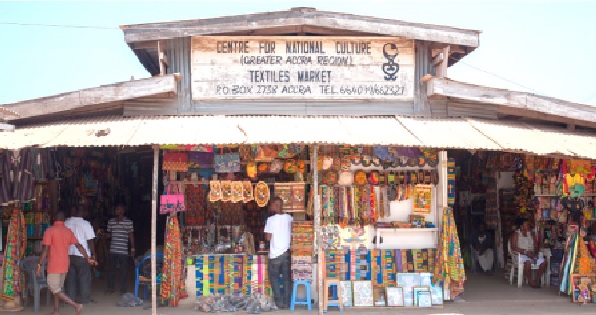Vendors of artefacts at the Arts Centre in Accra are at odds with some tour guides, accusing them of encroaching on their trade.
They claim business has declined because some tour guides are now doubling as artefact sellers. Instead of bringing tourists to the centre, the guides allegedly deliver the items directly to visitors at their hotels.
According to the vendors, this practice discouraged potential customers from visiting the Arts Centre, pushing them to shop elsewhere.
A spokesperson for the vendors, Akwasi Tumffour, alleged that many tour guides no longer brought tourists to the centre after selling artefacts to them privately.
Another vendor, Kwaku Osei, noted that the Arts Centre, which operates under the Ministry of Tourism, Culture and Creative Arts, had a mandate to promote, sustain, and develop cultural and artistic excellence.
“It is wrong for tour guides to attempt to take over our trade. The centre is a vibrant hub for Ghanaian arts and crafts, showcasing the country to tourists, and this practice must be checked,” he said.
He added that the centre’s executives had reported the matter to the Ghana Tourism Authority (GTA) several times, but the situation persisted.
“The tour guides are all selling artefacts now. We cannot sit here all day, make no sales, and watch them take our customers to hotels to sell the same items we offer,” he lamented.
Family legacy at risk
Madam Ama Ampomah, whose grandparents were among the pioneers of the Arts Centre, said the trade was a family legacy brought from Ntonsu in the Ashanti Region.
“Our parents handed it over to us, and we cannot allow tour guides to destroy the business. Tourists must be allowed to come here to shop — this is the epicentre of artefact sales in the capital,” she stressed.
Tour guides and their role
Tour guides are professionals who lead tourists, provide commentary, and interpret cultural and natural attractions. They play a vital role in the tourism industry, enhancing visitor experiences with insights, historical context, and local knowledge.
However, the Chairman of the Traditional Kente, Culture and Adinkra Manufacturers/Sellers Association at the Arts Centre, Charles Kofi Appiah, accused some guides of abusing this role.
“On days when they bring tourists here, they don’t allow them to walk freely into the shops. They dictate who to buy from, and this sometimes puts visitors in difficult situations, including losing money or valuables,” he said.
Mr Appiah urged visitors to walk into the shops and avoid “goro boys” who acted as middlemen in front of the centre.
“That is the only way to shop safely without difficulties,” he advised.
He also raised concerns about the influx of imitation goods, which he said were cheaper and had become the preferred choice for many buyers, to the detriment of genuine artisans.
“Only guests from America seem to insist on buying quality products. The Tourism Ministry and the GTA must crack the whip to stop the imitation of Made-in-Ghana goods, which is destroying our local arts and crafts,” he urged.
Response from tour guides
Responding to the allegation, the Chairman of the Greater Accra Chapter of the Tour Guides Association (TGA), Mr Elvis Wallis Bruce, described the accusation as “untrue,” stating, “This is the first time I am hearing it.”
“Then they should name those tour guides. Tour guides can't take over the business because how would they even know what the tourists want, or bring those items to their hotels?” he queried.
Another member of the TGA, Nii Ayi Solomon, who has worked as a tour guide for 15 years, said they were not permitted to follow tourists into the Arts Centre.
“I am very surprised at this allegation. We leave the tourists to shop on their own,” he explained.
He also complained about some vendors selling to foreigners at excessively high prices. “When we ask them to reduce the price, they quickly say, 'You are a Ghanaian, you are a brother, so why are you trying to spoil my business?”
“For instance, a small purse that vendors sell here for GH₵1,000 can be found at the Kumasi Cultural Centre for much less. Sometimes, tourists question us as if we deliberately take them to places where they will be overcharged. That is why we now teach tourists how to bargain,” he said.
Writer’s email address: lydiaezit@gmail.com

